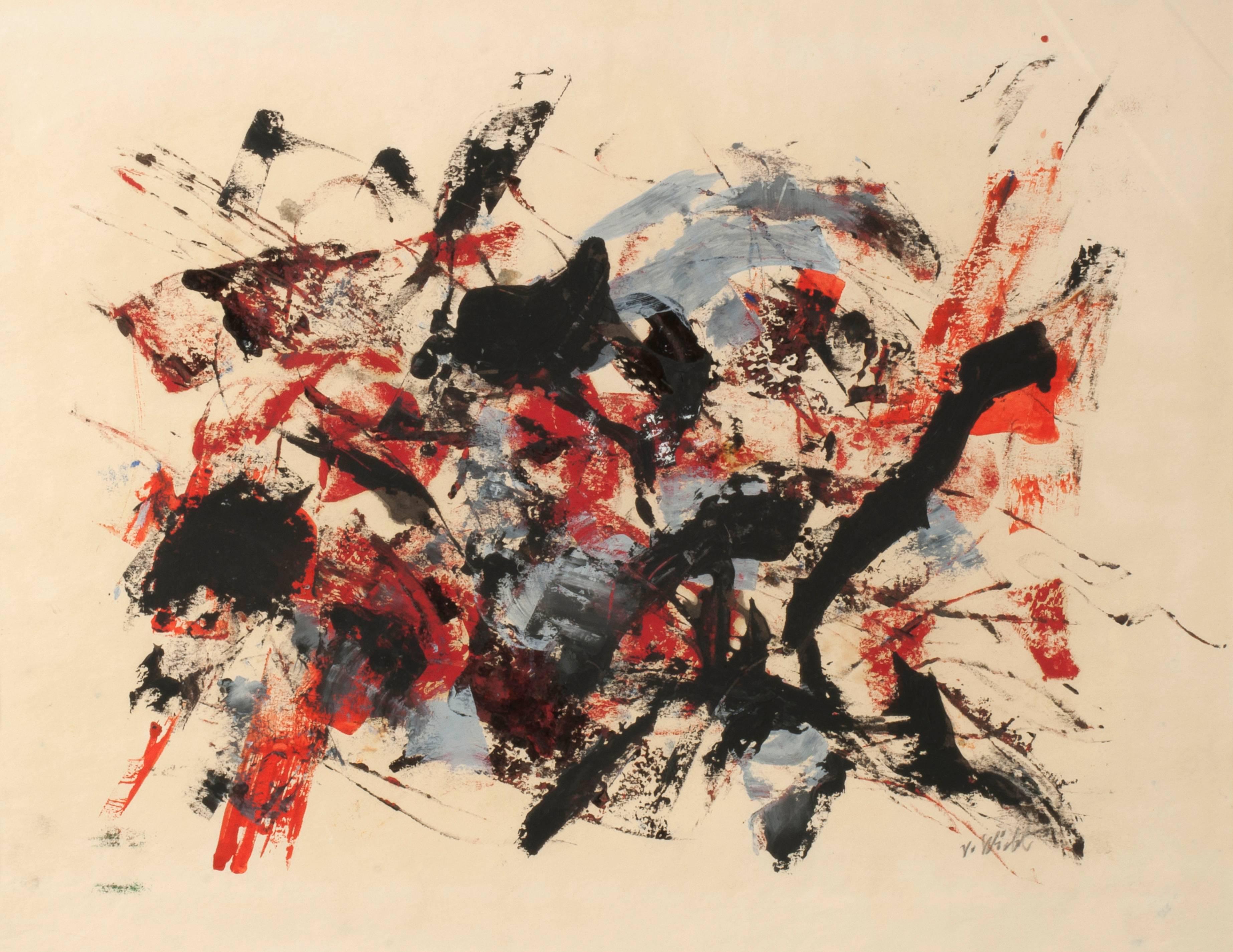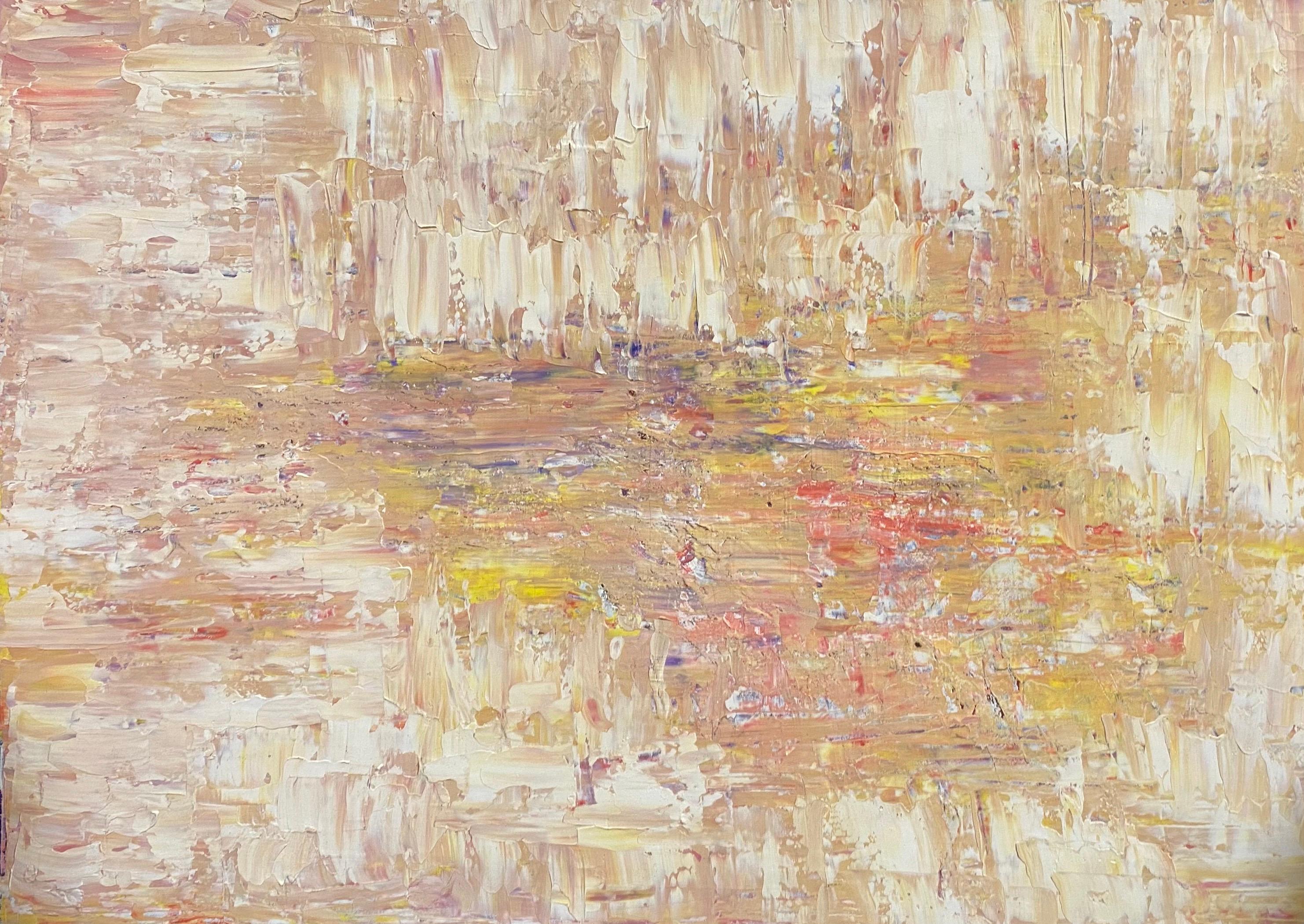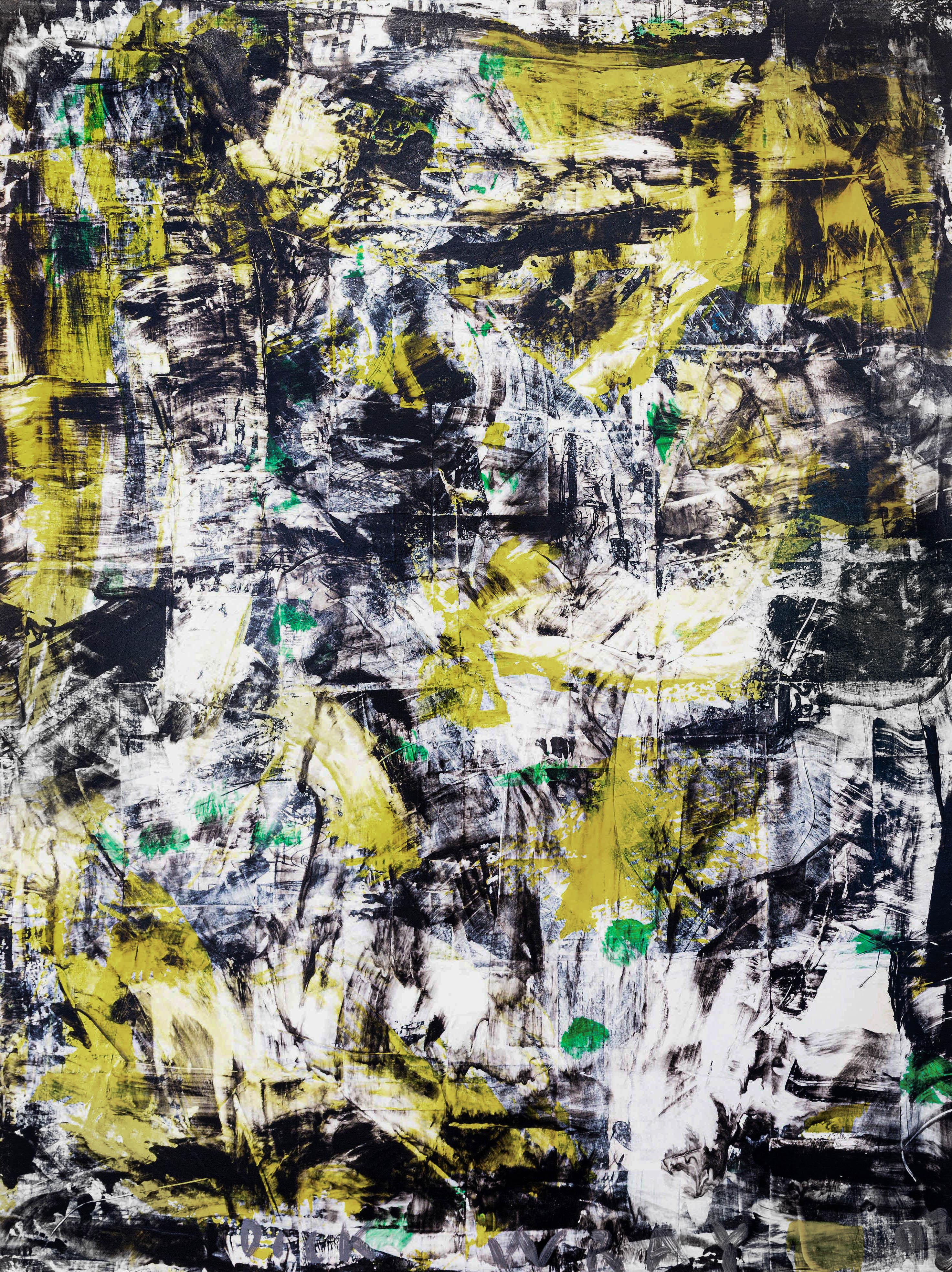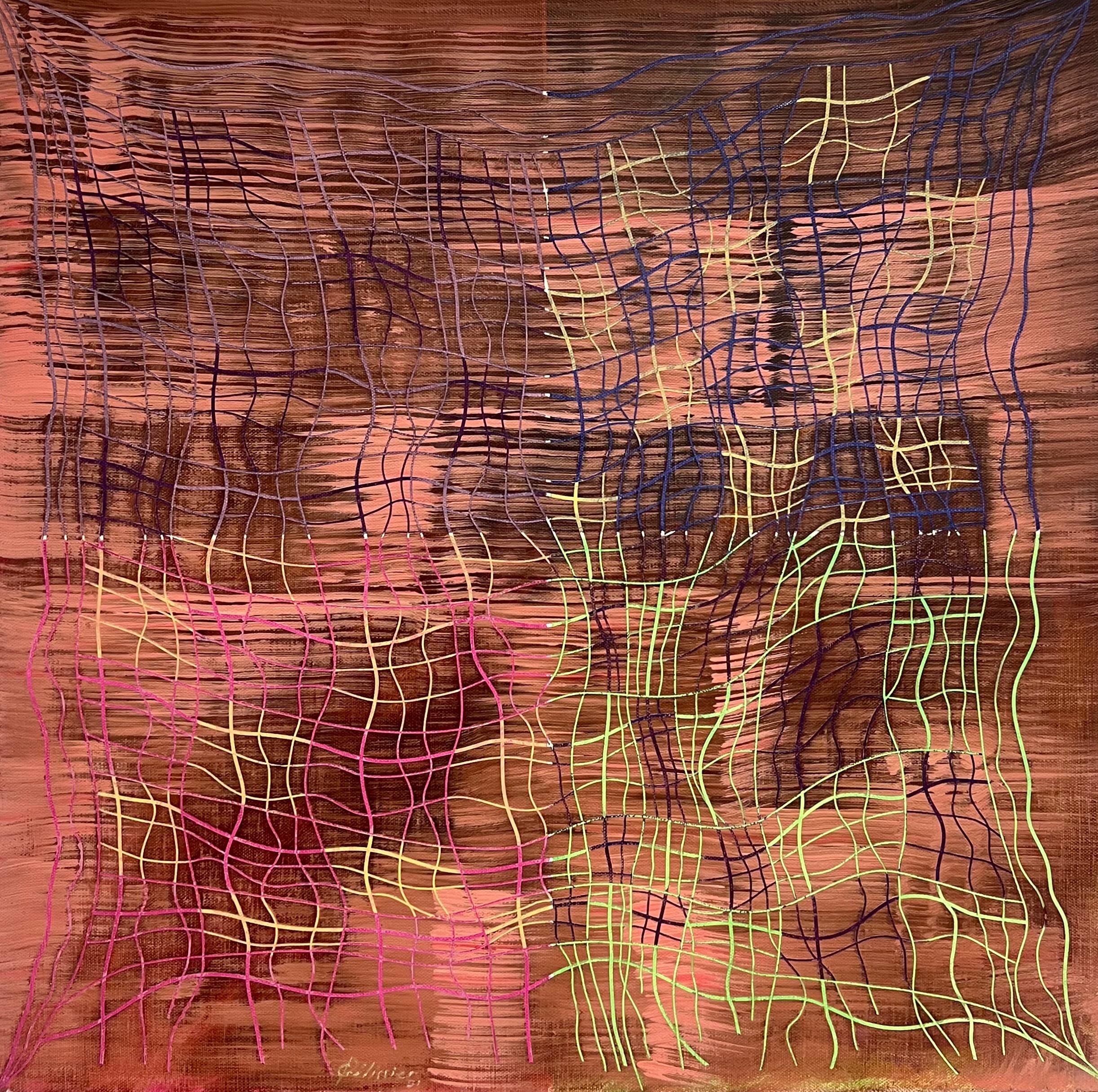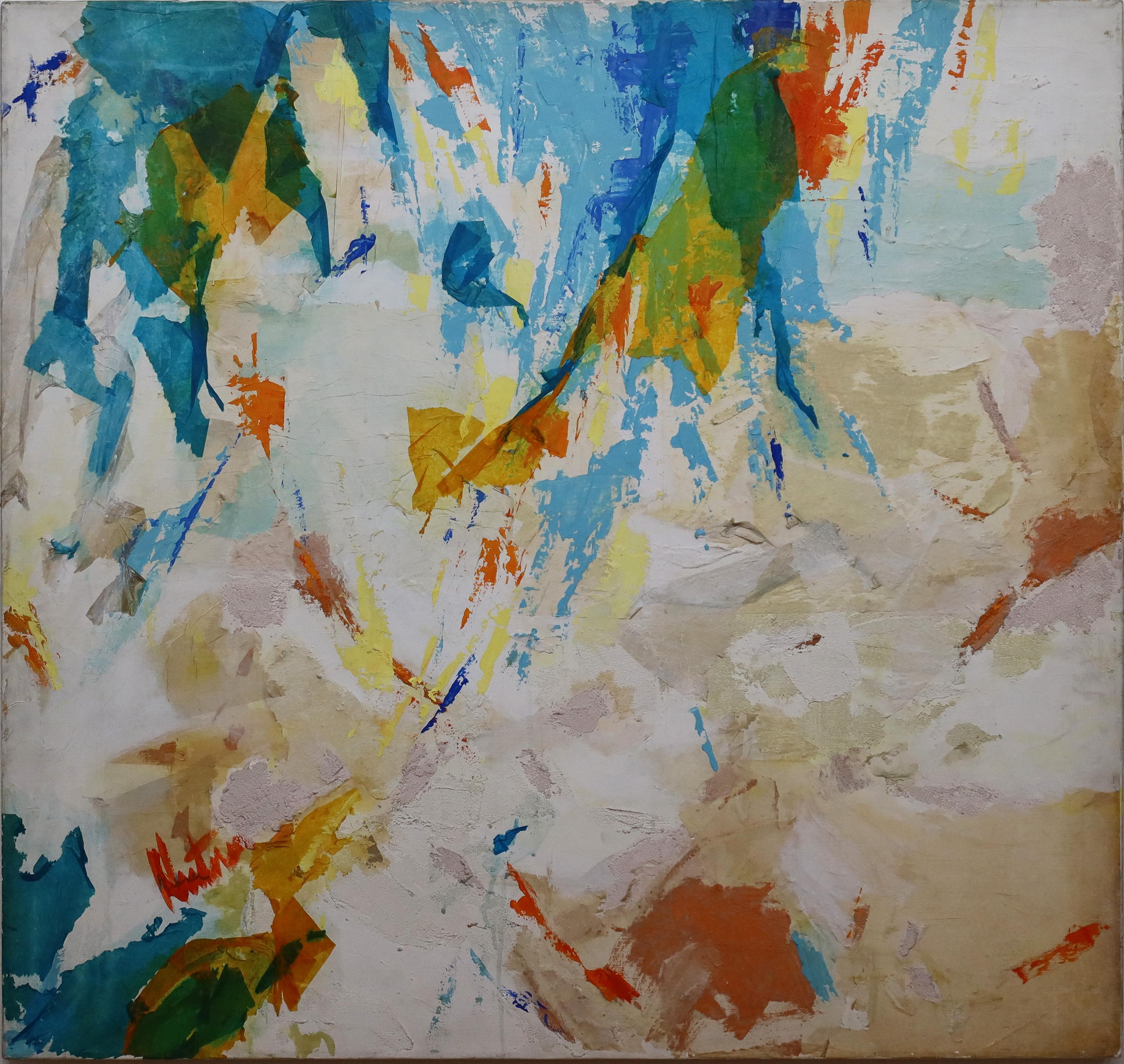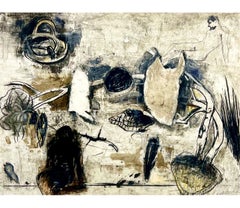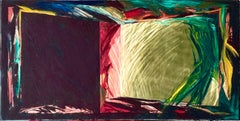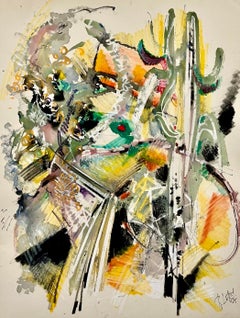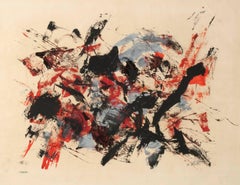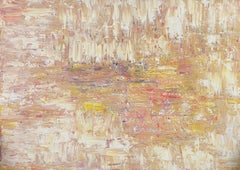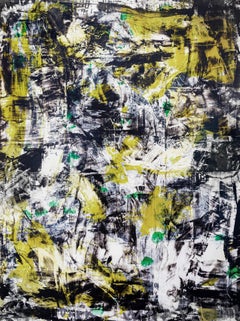Items Similar to Large Abstract Expressionist Oil Painting on Rice Paper Modernist John Von Wicht
Want more images or videos?
Request additional images or videos from the seller
1 of 19
John Von Wicht Large Abstract Expressionist Oil Painting on Rice Paper Modernist John Von Wichtc.1960's
c.1960's
$3,800
£2,898.38
€3,300.55
CA$5,340.16
A$5,824.19
CHF 3,085.26
MX$69,823.81
NOK 39,292.56
SEK 35,930.13
DKK 24,658.34
About the Item
John von Wicht (American, 1888-1970)
Oil on Japanese Rice Paper. Hand signed and dated in pencil lower right.
Sheet Size: 21 x 29.25 in.
Johannes Von Wicht was born in Holstein, Germany on February 3, 1888. His mother moved the family to Oldenburg when Von Wicht was in elementary school and he began to visit the artist Gerhard Bakenhus. Von Wicht’s mother had arranged for him to apprentice at the studio of master painter F.W. Adels. There he learned to prepare paints with linseed oil and later commented on the lasting impression of colors throughout his career. Interior of a Farmhouse was his first painting completed in 1907. Gerhard Bakenhus was able to include the painting to in the Bremer Kunsthalle exhibition in 1908. Due to the critical success of this piece Von Wicht was accepted to the private art school of the Grand Duke of Hesse in Darmstadt. Fundamental themes of simplicity, nature, and poetry were instilled in the students. The students also studied ancient art, Chinese and Japanese calligraphy, as well as Mathias Grünewald, Albrecht Dürer, Martin Schongauer, Hans Memling, and other German masters whose work was in local collections. Von Wicht subsequently studied printing methods at the Royal School for Fine and Applied Arts in Berlin, but said he skipped class frequently to visit exhibitions of the newest painting—van Gogh, Paul Cézanne, Edvard Munch, Paul Gauguin, Wassily Kandinsky, and Franz Marc. Von Wicht continued to pursue the arts with a three-year scholarship to the Royal School of Fine & Applied Arts in Berlin. There he was influenced by the city’s avant-garde art scene. In 1911 his work was included in the Free Berlin Secession exhibition.
During his service in WWI Von Wicht was wounded and partially paralyzed. While recovering he worked on book designs and illustrations. In 1923 Von Wicht immigrated to the United States, leaving a post-war Berlin and its economic hardships. He found his place at the Ardsley Art Academy in Brooklyn and secured a job at the U.S. Printing and Lithography Company, later moving to work at Ravenna Mosaic. While working for the mosaic company, Von Wicht designed a vestibule for the St. Louis Cathedral in a classic Byzantine manner. After a few years he had established enough contacts to become an independent mosaic contractor, setting up an office on Park Ave to handle private commissions, with a studio in Brooklyn Heights.
Von Wicht’s first attempt at abstraction was not until 1937 when he created his “Force” series in watercolor, commemorating Juliana Force, the first director of the Whitney Museum of American Art. This group of paintings were clearly influenced by Kandinsky’s geometrical abstractions. In 1941 Von Wicht was accepted into a show at the Whitney, whereupon he was recognized and acknowledged both by his critics as well as his peers. Challenged by cubism and surrealism, Von Wicht had yet to find his own personal artistic vocabulary within abstract expressionism. By 1950 Von Wicht was painting full time and able to explore his personal expression of abstraction as a mature artist, returning to drawing in order to solve problems of content and composition. Far Eastern calligraphy was a major influence for Von Wicht that moved his works into a more vertical format. In 1951 Von Wicht had his second solo exhibit at the Passedoit Gallery, which won him much critical acclaim. He held another show at the Passedoit in 1954 with works based on musical symphonies, using elements of abstraction to provide a spiritual analysis of the music itself. He created innovative works on rice paper while spending a winter at the McDowell Colony, an artist-in residence program in New Hampshire. He attempted automatic sketching as a direct translation of inner movement to find equilibrium within his work.
Towards the end of the 1950’s, Von Wicht contract with the Passedoit Gallery ended and he moved to the Bertha Schaefer Gallery (She introduced the work sculptors Kenneth Armitage and Eduardo Chillida, championed the paintings of Marsden Hartley and Alfred Maurer and Bauhaus artists). His first European show was in held 1959 in Paris, with others following in Brussels, Liege, and Belgium.
Select Solo Exhibitions
1924 Brooklyn Institute of Art and Science
1936 Architects Building, NYC
1939 Theodore A. Kohn & Son, NYC
1944 Artists’ Gallery, NYC
1947 University of California, Los Angeles
1950 Passedoit Gallery, NYC
1959 Galerie Internationale d’Art Contemporain, Paris, France
Galerie Europe, Brussels, Belgium
Association pour e Progrès Intel et Artistique de la Wallonie (APIAW), Liége Belgium
Esther Robles Gallery, Los Angeles
Santa Barbara Museum, Santa Barbara
1960 Galeria Mayer, Madrid, Spain
1960 The Bertha Schaefer Gallery, NYC (1962, 1964, 1966)
1962 Galerie Neufville, Paris
1964 Galerie Leonhard, Munich, Germany
1966 Joseph Grippi Gallery, NYC
1973 Oscar Krasner Gallery, NYC
1979 Marden Fine Arts, NYC
1989 Galerie Kaupa, Germany
1990 “Kunstverein March,” Germany
1992 Galerie Michael Rasche, Freiburg, Germany (2000)
1993 Gallery Berman-Daferner, NYC (1995)
1993 Susan Teller Gallery, NYC
1999 Kraushaar Gallery, NYC
2002 Ostholsteinisches Landesmuseum, Eutin, Germany
Select Group Exhibitions
1940 Galerie St. Etienne, NYC
1941 Metropolitan Museum of Art
1945-48 Brooklyn Museum
1941 Whitney Museum of American Art Annuals and Biennial
1946 National Academy Galleries, NYC
1946 Kleeman Gallery, NYC
Grand Central Art Galleries, Inc., NYC
Montclair Art Museum, Montclair, NJ
Pennsylvania Academy of Fine Arts, Philadelphia, PA
Palais des Beaux Arts de la Ville de Paris, France
New School for Social Research, NYC
Museum of Modern Art
National Arts Club, NYC
Bertha Schaefer Gallery
The Print Club, Philadelphia, PA
Corcoran Gallery of Art, Washington DC
The Butler Institute of American Art, Youngstown, OH
Library of Congress, Washington, D.C.
“The Second Wave: American Abstraction of the 1930s and 1940s,” Worcester Art Museum, MA
“A Century of MacDowell Colony Artists,” The Currier Art Gallery, Manchester, NH
Museu de Mallorca, Mallorca, Spain
“The Stamp of Impulse: Abstract Expressionist Paintings,” Worcester Art Museum, MA
He was a member of American Abstract Artists, Audubon Society of Artists, Brooklyn Society of Artists and Salons of America.
- Creator:John Von Wicht
- Creation Year:c.1960's
- Dimensions:Height: 21 in (53.34 cm)Width: 29.25 in (74.3 cm)
- Medium:
- Movement & Style:
- Period:
- Condition:good. minor wear. please see photos.
- Gallery Location:Surfside, FL
- Reference Number:1stDibs: LU38214293932
About the Seller
4.9
Platinum Seller
Premium sellers with a 4.7+ rating and 24-hour response times
Established in 1995
1stDibs seller since 2014
1,845 sales on 1stDibs
Typical response time: 1 hour
- ShippingRetrieving quote...Shipping from: Surfside, FL
- Return Policy
More From This Seller
View AllAmerican Modernist Abstract Expressionist Oil Painting Carving William Pellicone
Located in Surfside, FL
William Pellicone (American 1915-2004)
Mixed media, pyrography, oil on wood carving painting. Dated 1958
Title - Enthymeme #14.
Oil painting on carved and burnt distressed wood panel.
Inscribed verso Enthymeme Wm. Pellicone #14, 9-4-58.
Label on reverse with a typed definition for Enthymeme.
Dimensions: 27 inches high, 42.5 inches wide.
Metal wrap frame.
Provenance: from a Shelter Island NY home that was designed by architect Henry J. Gazon - A.I.A. built in 1959.
William Pellicone (1915-2004) was an American painter known for his abstract compositions and use of vibrant colors. He was born in New York City and studied at the Art Students League and the Brooklyn Museum Art School. Pellicone's early work was influenced by the Social Realist movement of the 1930s and 1940s, with his paintings often featuring realistic depictions of urban scenes and working-class people. However, in the 1950s he shifted towards abstraction, exploring the interplay of color and form. Pellicone's mature style was characterized by his use of vibrant, saturated colors, often applied in thick layers of paint. His paintings often featured geometric shapes and organic forms, with a strong sense of movement and energy. In addition to his painting, Pellicone was also a respected teacher and arts administrator. He taught at the New York Institute of Technology and the State University of New York, and served as the director of the Islip Art Museum on Long Island. Pellicone's artwork was exhibited widely during his lifetime, and he was the recipient of numerous awards and honors, including a National Endowment for the Arts grant in 1977. Today, his paintings can be found in the collections of museums and galleries around the world, including the Smithsonian American Art Museum in Washington, D.C. and the Metropolitan Museum of Art in New York.
William Pellicone (Born 1915) is active/lives in New York. William Pellicone is known for Abstract expressionist, landscape and non-objective art. An American artist, sculptor, architect. He exhibited at Pennsylvania Academy Fine Arts...
Category
1950s Abstract Expressionist Abstract Paintings
Materials
Wood, Oil
Large Abstract Expressionist Taiwanese Painting Chihung Yang Chinese Art
Located in Surfside, FL
Chihung Yang
American (b. 1947)
Untitled (Black and Brown Composition) (1986)
Mixed media (acrylic, pastel) on paper
Hand signed lower right
Sheet 38 x 50 inches, frame dimensions: 45 x 57 x 2 inches, wood frame with glazing
Provenance:= From a Corporate Art Collection
Yang Chihung (Chinese: 楊識宏; pinyin: Yang Chihung; born 1947) Taiwanese-American artist.
Yang Chi-hung was born on 25 October 1947, in Chungli, Taiwan. He developed an interest in art in early childhood, and found inspirations to pursue an artist career after reading Lust for Life – The Life of Vincent van Gogh, translated by poet Yu Kuang-chung, in junior high school. Between 1965 and 1968, he attended the National Taiwan College of Art, developing a sound foundation in oil painting under the tutelage of famous Taiwanese artists of the Japanese Colonial period, such as Liao Chi-chun, Li Mei-shu and Yang San-lang. Meanwhile, he actively attended events organized by the modern art groups of Taiwan, namely the Fifth Moon Group and Ton Fan Group, only to find himself both intimidated and dissatisfied with the then relatively conservative art environment in Taiwan. In 1979, he emigrated to the United States of America with his wife, Jane, and their son, Daniel. His pioneering works soon landed him the “Outstanding Asian-American Artist” award. The concept and style of abstract expressionism as represented by the works of Jackson Pollock in the 1950s had great impact on Yang’s work. With the sense of nihilism that gave rise to abstract expressionism in the post-war period, artists no longer clamored to depict the external environment, but rather chose to focus on their own inner experience. Yang Chihung embraced this spirit about the early 1990s when his style turned abstract. In 1984–85 and again in 1985–86, he was twice awarded a year's residency at The Clocktower Studio in New York City by MoMA P.S.1.
In 2013, Yang, along with Xu Bing, Zhang Huan, and Li Chen, were the four artists featured in the Discovery Channel Asia documentary series, Chineseness, a multi-series production that focused on postwar Chinese contemporary artists.
He is of the generation of artists such as Chen Tingshi, Liang Yifeng, Yang Yuyu, Pang Jiun, Yinhui Chen, Jui-Ling Hung, De-Jinn Shiy, Yong-ik Cho, Wan Chuan Chang, Kuosung Liu, Sanlang Yang, Chetsai Shen, Fu-sheng Ku, Chunxiang Zhao, Ming Ju, Ming-Che Huang, Jiutong Liu, In-Ting Ran, George Chann, Yi Hong, Tzu-Chi Yeh, Max Liu, Yi-Hsiung Chang, Che Chuang
Awards and recognition
1989, Outstanding Asian American Artist Award, by Governor of New York
1984–1986, MoMA P.S.1 National Studio Program, Residency at Clocktower Studio, New York
SELECTED GROUP EXHIBITIONS
1969 Contemporary Young Artists Exhibition, U. S. I. S. Lincoln Center, Taipei, Taiwan
1974 Asian Contemporary Art Exhibition, Ueno Museum of Art, Tokyo, Japan
1977 10 Chinese Leading Artists, Metropolitan Museum of Art, Tokyo, Japan
1978 Contemporary Chinese Art from Taiwan, Hong Kong Arts Centre, Hong Kong
1978 International Exhibition of Prints, National Museum of Modern Art, Seoul, South Korea
1979 6th British International Print Biennial, Bradford Art Galleries and Museum, England
1980 4th Miami International Print Biennial, Metropolitan Museum Coral Gables, Florida
1982 Summer Invitational, Susan Caldwell Inc, New York City
1982 Four Artists, SoHo Center for Visual Artists, New York City
1983 New Acquisitions and Trustee's Choice, The Aldrich Museum of Contemporary Art,
1983 Cleveland (UK) 6th International Drawing Biennale, Middlesbrough Art Gallery, England
1983 Dreams Demons Madness, Alternative Museum, New York City
1984 Rambunctious, Siegel Contemporary Art, New York City
1984 Invitational Painting Exhibition, Part II: Eight Imagist Painters, Siegel Contemporary Art, NYC
1984 Salvo, Ruth Siegel Ltd, New York
1984 Modern Art, Ted Greenwald Gallery, New York City
1985 Exotica, Paintings and Works on Paper, Stephen Rosenberg Gallery, New York City
1985 The Art of the 1970s and 1980s, Aldrich Museum of Contemporary Art, Ridgefield, CT
1985 Large Figurative Drawings...
Category
1980s Abstract Expressionist Abstract Paintings
Materials
Oil Pastel, Mixed Media, Acrylic, Archival Paper
Large California Modernist Abstract Laddie John Dill Abstract Oil Painting Art
By Laddie John Dill
Located in Surfside, FL
Laddie John Dill (American, b. 1943)
Untitled
Oil painting on canvas mounted on panel
Hand signed Laddie Dill (verso)
36 x 72 inches. (with frame 37 X 73)
Laddie John Dill was born ...
Category
1980s Post-Modern Abstract Paintings
Materials
Canvas, Oil, Board
Large Modernist Art French Abstract Expressionist Colorful Painting Roger Lersy
By Roger Lersy
Located in Surfside, FL
Roger Lersy, French (1920 - 2004)
Painting on paper (not sure if this is watercolor, acrylic or oil, the paper has a velvet finish and texture to it and there is some texture to the ...
Category
1960s Abstract Expressionist Abstract Paintings
Materials
Paint, Paper
Large Abstract Expressionist Color Monotype Oil Painting Tom Lieber Mixed Media
By Tom Lieber
Located in Surfside, FL
Tom Alan Lieber, (American, born 1949),
GTW #11 -7, 1986,
Oil and mixed media on paper,
30.25 x 44 inches,
Hand signed and dated lower right
Provenance: Garner Tullis Workshop, ...
Category
1980s Abstract Expressionist Abstract Paintings
Materials
Mixed Media, Oil, Monotype
Mod Abstract Expressionist W/C Painting Bernard Segal New Hope PA Modernist Art
Located in Surfside, FL
Framed 19 x 26. Image 14 X 21
Bernard Segal was born in Cincinnati, Ohio and attended Cincinnati University and the Cincinnati Art Academy. He was known for figure, abstract painti...
Category
1960s Abstract Expressionist Abstract Paintings
Materials
Paper, Watercolor
You May Also Like
Untitled Abstraction
By John von Wicht
Located in Fairlawn, OH
Untitled Abstrraction
Gouache, watercolor and pigments on paper, c. 1960
Signed lower right in pencil (see photo)
Image: 17 x 22 inches
Sheet: 25 1/4 x 29 3/4 inches
Frame: 25 1/4 x ...
Category
1960s Abstract Expressionist Abstract Drawings and Watercolors
Materials
Watercolor
Large 20th Century Original French Expressionist Oil Painting
Located in Cirencester, Gloucestershire
Original oil painting by P. Valetti (French, second half 20th century)
oil on canvas, unframed
size: 19.75 x 28.75 inches
condition: very good
provenance: from the artists estate, Fr...
Category
20th Century Abstract Expressionist Abstract Paintings
Materials
Canvas, Oil
$472 Sale Price
30% Off
"Untitled, " Oil, Mixed Media on Canvas - Abstract Impressionist painting
By Dick Wray
Located in Houston, TX
While this work may stray from the diverse range of color and textures that usually dominate Wray’s canvases, one can see how the quick and emotive treatment of the paint still captu...
Category
Early 2000s Abstract Expressionist Abstract Paintings
Materials
Mixed Media, Oil, Canvas
Untitled-113 mixed media abstraction on paper by John Von Wicht
By John von Wicht
Located in Hudson, NY
One of a group of over 100 works personally selected by the artist and gifted to a close personal friend in 1969, this work was never matted, framed, glued, taped or exposed to light...
Category
1950s Abstract Expressionist Abstract Drawings and Watercolors
Materials
Paper, Mixed Media
French 20th Century Abstract Composition Oil Painting on Canvas
Located in Cirencester, Gloucestershire
Abstract Expressionist Composition
by Gilbert Pelissier (French born 1924)
signed and dated verso
oil painting on canvas, unframed
canvas size: 20 x 20 inches
condition: overall very...
Category
Late 20th Century Abstract Expressionist Abstract Paintings
Materials
Canvas, Oil
Large Scale Antique American Abstract Expressionist Signed Original Oil Painting
Located in Buffalo, NY
Antique American modernist abstract oil painting. Oil on canvas. Signed.
Category
1950s Abstract Abstract Paintings
Materials
Canvas, Oil
$1,996 Sale Price
20% Off
More Ways To Browse
Mid Century Abstract Cubism Art
Rice Paper Vintage
Marc Franz
Mid Century Modern Winter Scene
Susan Teller Gallery
Lebanon Painting
Lee Wolfe
Looking Back Painting
Matthew Dibble
Maurice Orange
Oil Paint Splatter
Rhino Horn
Tania Dibbs
White Plaster Art Canvas
Abstract Art Non Figurative
Adam Sultan
Brion Gysin
California Abstract Expressionist Art
